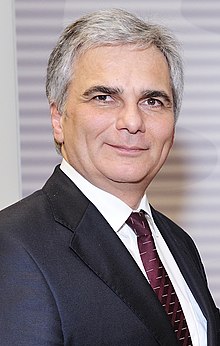Werner Faymann
Werner Faymann | |
|---|---|
 | |
| Chancellor of Austria | |
| Assumed office 2 December 2008 | |
| President | Heinz Fischer |
| Deputy | Josef Pröll Michael Spindelegger Reinhold Mitterlehner |
| Preceded by | Alfred Gusenbauer |
| Minister for Transport, Innovation and Technology | |
| In office 11 January 2007 – 23 November 2008 | |
| Chancellor | Alfred Gusenbauer |
| Preceded by | Hubert Gorbach |
| Succeeded by | Doris Bures |
| Personal details | |
| Born | 4 May 1960 Vienna, Austria |
| Political party | Social Democratic Party |
| Spouse | Martina Ludwig |
| Children | 2 |
| Signature |  |
Werner Faymann (German: [ˈvɛɐ̯nɐ ˈfaɪman]; born 4 May 1960) is an Austrian politician who has been Chancellor of Austria and chairman of the Social Democratic Party of Austria (SPÖ) since 2008.
Early life and education
Werner Faymann was born in Vienna, Austria[1] and graduated from grammar school (en‑GB) / high school (en‑US) there.[2] He enrolled at the University of Vienna (jurisprudence, political science, and history of art) but attended just one lecture there without taking any exams. Instead, he worked as a taxi driver.[3]
Career
In 1981, Faymann became provincial chairman of the Socialist Youth Vienna (Sozialistische Jugend Wien). From 1985 to 1988 Faymann was a consultant to the bank Zentralsparkasse der Gemeinde Wien (now UniCredit Bank Austria AG). The bank at the time was closely linked to the municipal government dominated by the Social Democrats.[4] He left the bank to become director and provincial chairman of the Viennese Tenants' counselling. Subsequently, he became a member of the Viennese state parliament and municipal council, where he held various positions concerning housing construction and urban renewal.[5]
Faymann was Federal Minister for Transport, Innovation and Technology in the Cabinet of Chancellor Alfred Gusenbauer. On 16 June 2008 Faymann succeeded Gusenbauer as chairman of the Social Democratic Party of Austria (SPÖ) and led the party in the snap legislative elections, held on 28 September 2008. The election was famously preceded by Faymann and Gusenbauer announcing a shift in the party's position towards the signing of new EU treaties, which they did by writing an open letter to Hans Dichand, the editor of the yellow press medium Kronen Zeitung. At the time, the Kronen Zeitung was the largest newspaper in the country. The letter caused a scandal within the party, as no party committee had been involved in deciding the shift. The pro-EU Austrian People's Party (ÖVP) cancelled the existing coalition, thus causing the elections. Faymann was known for his good relationship to now-deceased Dichand, who would also support him in the following election campaign. Although the SPÖ lost 11 seats, and had a 6% swing against it (in fact, their worst result since World War II), they came out ahead of their main rivals Austrian People's Party in regard to seats (57 to 51) as well as to share of the vote (29.26% to 25.98%).[5][6] Afterwards, Faymann renewed the coalition with the Austrian People's Party, as he had announced before the election.
Chancellor
As head of the largest party in the National Council of Austria, Faymann was asked by Federal President Heinz Fischer on 8 October 2008 to form a new government.[7]
A coalition between the SPÖ and the ÖVP was agreed upon on 23 November 2008 and was sworn in on 2 December 2008.[8]
In domestic affairs, Faymann's administration has been notable in enacting a wide range of progressive reforms in areas such as education and social security.[9][10][11]
Private life
Faymann is a Roman Catholic.[1] He is married and has two children.[5][12]
See also
References
- ^ a b "Chancellor of Austria". World Diplomacy. Retrieved 31 January 2013.
- ^ Hahn, Nadja (18 September 2013). "Werner Faymann states that he graduated from grammar school/high school". www.twitter.com (in German). Retrieved 15 August 2014.
- ^ "Interview in Austrian television" (video). YouTube (in German). 2012. Retrieved 1 August 2014.
- ^ "AVZ-Stiftung: Wie gewonnen, so zeronnen" (news) (in German). 2012. Retrieved 15 January 2015.
- ^ a b c "Curriculum Vitae of Werner Faymann". Federal Chancellery of Austria. Retrieved 11 March 2009.
- ^ "Nationalratswahlen 2008" (in German). Federal Ministry of the Interior. Retrieved 11 March 2009.
- ^ "Austrian President Fischer Asks Faymann to Form Government". Bloomberg L.P. 8 October 2008. Retrieved 11 March 2009.
- ^ "New Austrian government takes office". International Herald Tribune. Associated Press. 2 December 2008. Retrieved 11 March 2009.
- ^ "News from Austria 2011: Federal Chancellery of Austria". Oesta. 3 January 2011. Retrieved 31 January 2013.
- ^ "Austria". Eiro Annual Review. Retrieved 31 January 2013.
- ^ "Austria". Eiro Annual Review. 2010. Retrieved 31 January 2013.
- ^ "Werner Faymann" (in German). Social Democratic Party of Austria. Retrieved 11 March 2009.
External links
 Media related to Werner Faymann at Wikimedia Commons
Media related to Werner Faymann at Wikimedia Commons- Werner Faymann's Party Site
- Federal Chancellor of Austria Site

